NURS2006 Report: Evidence Based Practice of CBT for Dementia
VerifiedAdded on 2023/01/09
|6
|1362
|94
Report
AI Summary
This report examines the application of evidence-based practice (EBP) in the context of dementia care. It begins with an introduction to the clinical problem of dementia, highlighting its impact on cognitive function and the prevalence of anxiety and depression among affected individuals. The report then formulates a clinical question using the PICOT format to investigate the effectiveness of Cognitive Behavioral Therapy (CBT) in reducing anxiety and depression symptoms in elderly people with dementia. The main body discusses the potential clinical issues associated with dementia, including the difficulties faced by nurses in providing adequate care, and supports the clinical question with a literature review. The report emphasizes the importance of early diagnosis and appropriate management of dementia and concludes with a summary of the findings, highlighting the potential benefits of CBT in improving the quality of life for dementia patients. The report is based on the course NURS2006: Clinical Governance and Practice Development, and follows the guidelines for a searchable clinical question.
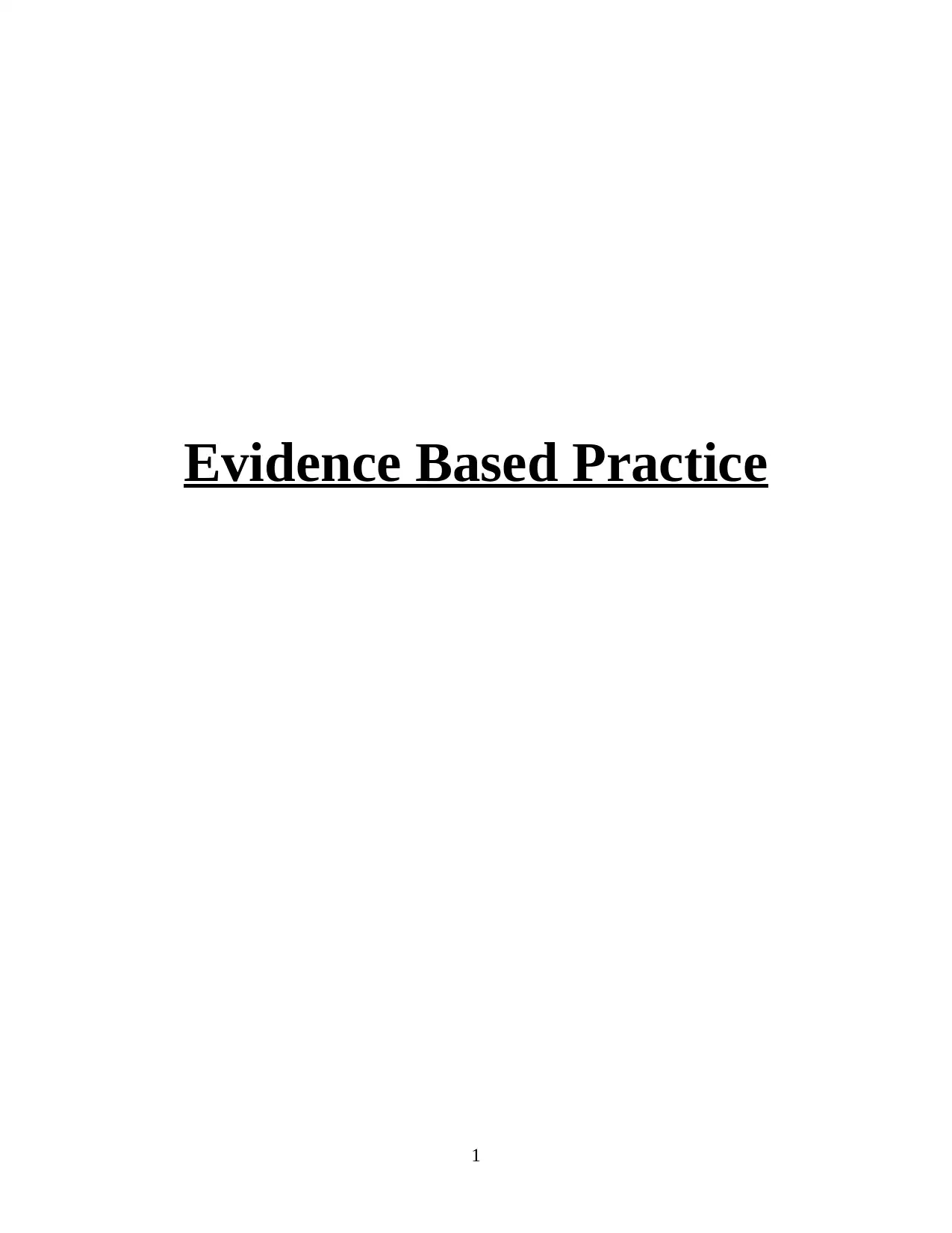
Evidence Based Practice
1
1
Paraphrase This Document
Need a fresh take? Get an instant paraphrase of this document with our AI Paraphraser
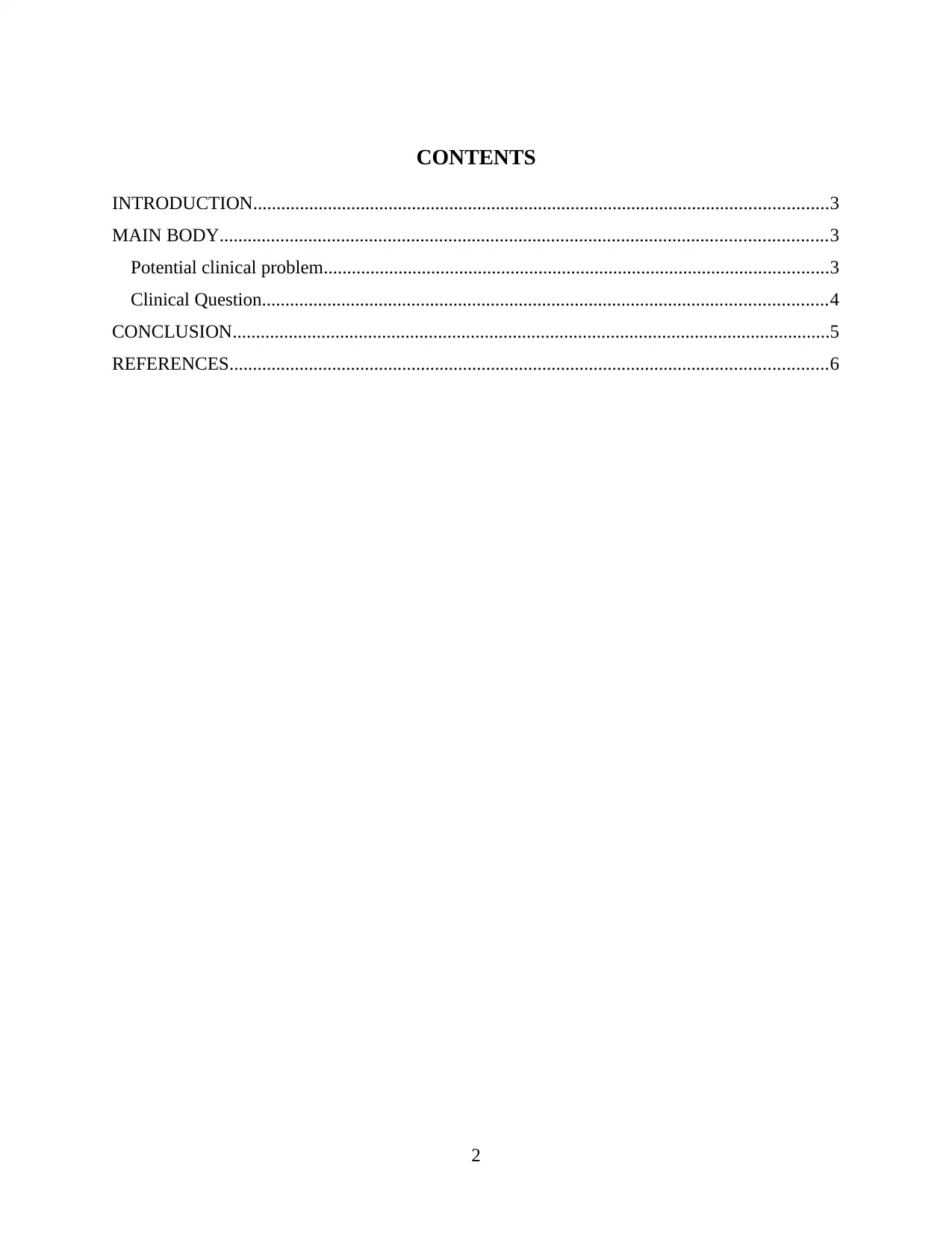
CONTENTS
INTRODUCTION...........................................................................................................................3
MAIN BODY..................................................................................................................................3
Potential clinical problem............................................................................................................3
Clinical Question.........................................................................................................................4
CONCLUSION................................................................................................................................5
REFERENCES................................................................................................................................6
2
INTRODUCTION...........................................................................................................................3
MAIN BODY..................................................................................................................................3
Potential clinical problem............................................................................................................3
Clinical Question.........................................................................................................................4
CONCLUSION................................................................................................................................5
REFERENCES................................................................................................................................6
2
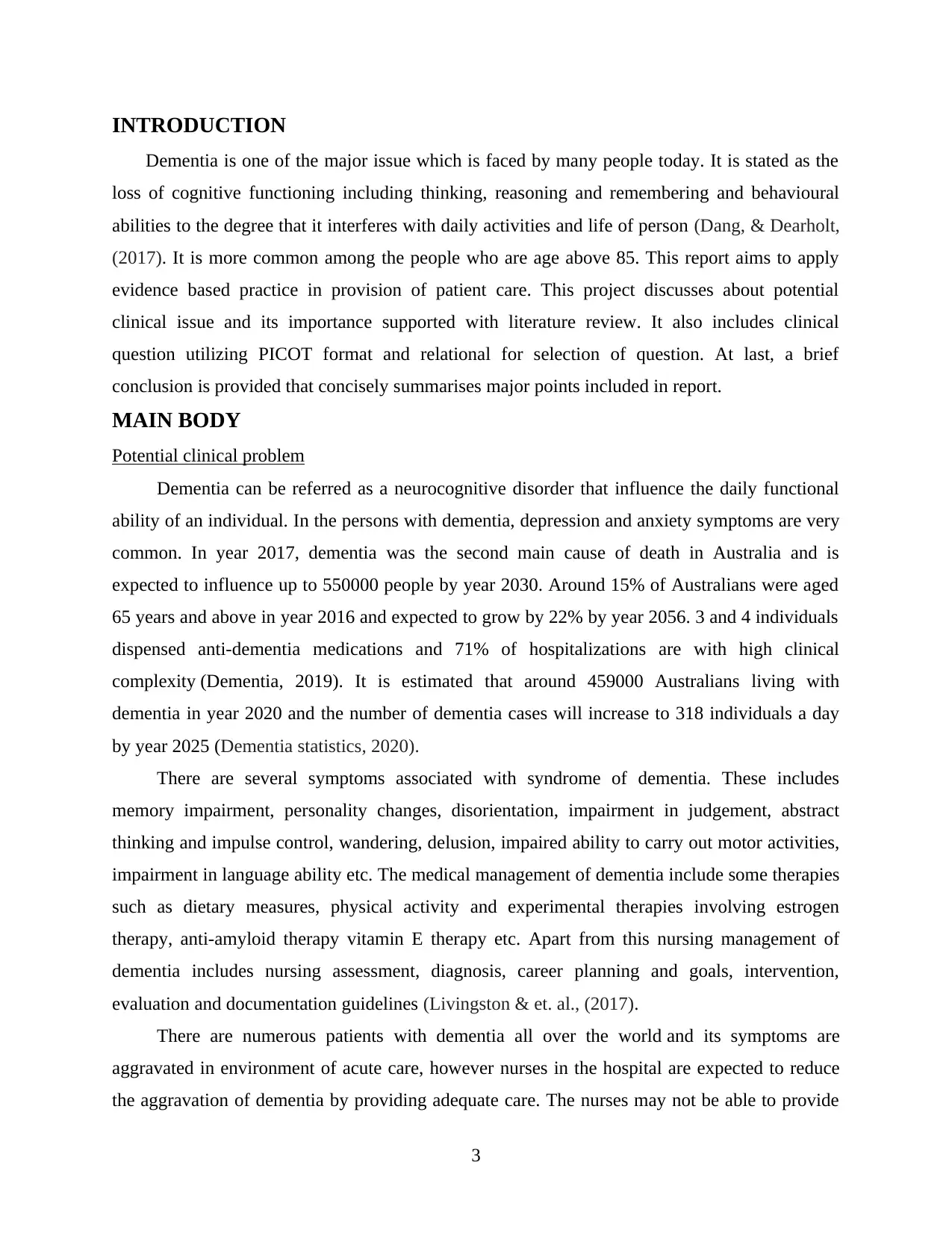
INTRODUCTION
Dementia is one of the major issue which is faced by many people today. It is stated as the
loss of cognitive functioning including thinking, reasoning and remembering and behavioural
abilities to the degree that it interferes with daily activities and life of person (Dang, & Dearholt,
(2017). It is more common among the people who are age above 85. This report aims to apply
evidence based practice in provision of patient care. This project discusses about potential
clinical issue and its importance supported with literature review. It also includes clinical
question utilizing PICOT format and relational for selection of question. At last, a brief
conclusion is provided that concisely summarises major points included in report.
MAIN BODY
Potential clinical problem
Dementia can be referred as a neurocognitive disorder that influence the daily functional
ability of an individual. In the persons with dementia, depression and anxiety symptoms are very
common. In year 2017, dementia was the second main cause of death in Australia and is
expected to influence up to 550000 people by year 2030. Around 15% of Australians were aged
65 years and above in year 2016 and expected to grow by 22% by year 2056. 3 and 4 individuals
dispensed anti-dementia medications and 71% of hospitalizations are with high clinical
complexity (Dementia, 2019). It is estimated that around 459000 Australians living with
dementia in year 2020 and the number of dementia cases will increase to 318 individuals a day
by year 2025 (Dementia statistics, 2020).
There are several symptoms associated with syndrome of dementia. These includes
memory impairment, personality changes, disorientation, impairment in judgement, abstract
thinking and impulse control, wandering, delusion, impaired ability to carry out motor activities,
impairment in language ability etc. The medical management of dementia include some therapies
such as dietary measures, physical activity and experimental therapies involving estrogen
therapy, anti-amyloid therapy vitamin E therapy etc. Apart from this nursing management of
dementia includes nursing assessment, diagnosis, career planning and goals, intervention,
evaluation and documentation guidelines (Livingston & et. al., (2017).
There are numerous patients with dementia all over the world and its symptoms are
aggravated in environment of acute care, however nurses in the hospital are expected to reduce
the aggravation of dementia by providing adequate care. The nurses may not be able to provide
3
Dementia is one of the major issue which is faced by many people today. It is stated as the
loss of cognitive functioning including thinking, reasoning and remembering and behavioural
abilities to the degree that it interferes with daily activities and life of person (Dang, & Dearholt,
(2017). It is more common among the people who are age above 85. This report aims to apply
evidence based practice in provision of patient care. This project discusses about potential
clinical issue and its importance supported with literature review. It also includes clinical
question utilizing PICOT format and relational for selection of question. At last, a brief
conclusion is provided that concisely summarises major points included in report.
MAIN BODY
Potential clinical problem
Dementia can be referred as a neurocognitive disorder that influence the daily functional
ability of an individual. In the persons with dementia, depression and anxiety symptoms are very
common. In year 2017, dementia was the second main cause of death in Australia and is
expected to influence up to 550000 people by year 2030. Around 15% of Australians were aged
65 years and above in year 2016 and expected to grow by 22% by year 2056. 3 and 4 individuals
dispensed anti-dementia medications and 71% of hospitalizations are with high clinical
complexity (Dementia, 2019). It is estimated that around 459000 Australians living with
dementia in year 2020 and the number of dementia cases will increase to 318 individuals a day
by year 2025 (Dementia statistics, 2020).
There are several symptoms associated with syndrome of dementia. These includes
memory impairment, personality changes, disorientation, impairment in judgement, abstract
thinking and impulse control, wandering, delusion, impaired ability to carry out motor activities,
impairment in language ability etc. The medical management of dementia include some therapies
such as dietary measures, physical activity and experimental therapies involving estrogen
therapy, anti-amyloid therapy vitamin E therapy etc. Apart from this nursing management of
dementia includes nursing assessment, diagnosis, career planning and goals, intervention,
evaluation and documentation guidelines (Livingston & et. al., (2017).
There are numerous patients with dementia all over the world and its symptoms are
aggravated in environment of acute care, however nurses in the hospital are expected to reduce
the aggravation of dementia by providing adequate care. The nurses may not be able to provide
3
⊘ This is a preview!⊘
Do you want full access?
Subscribe today to unlock all pages.

Trusted by 1+ million students worldwide
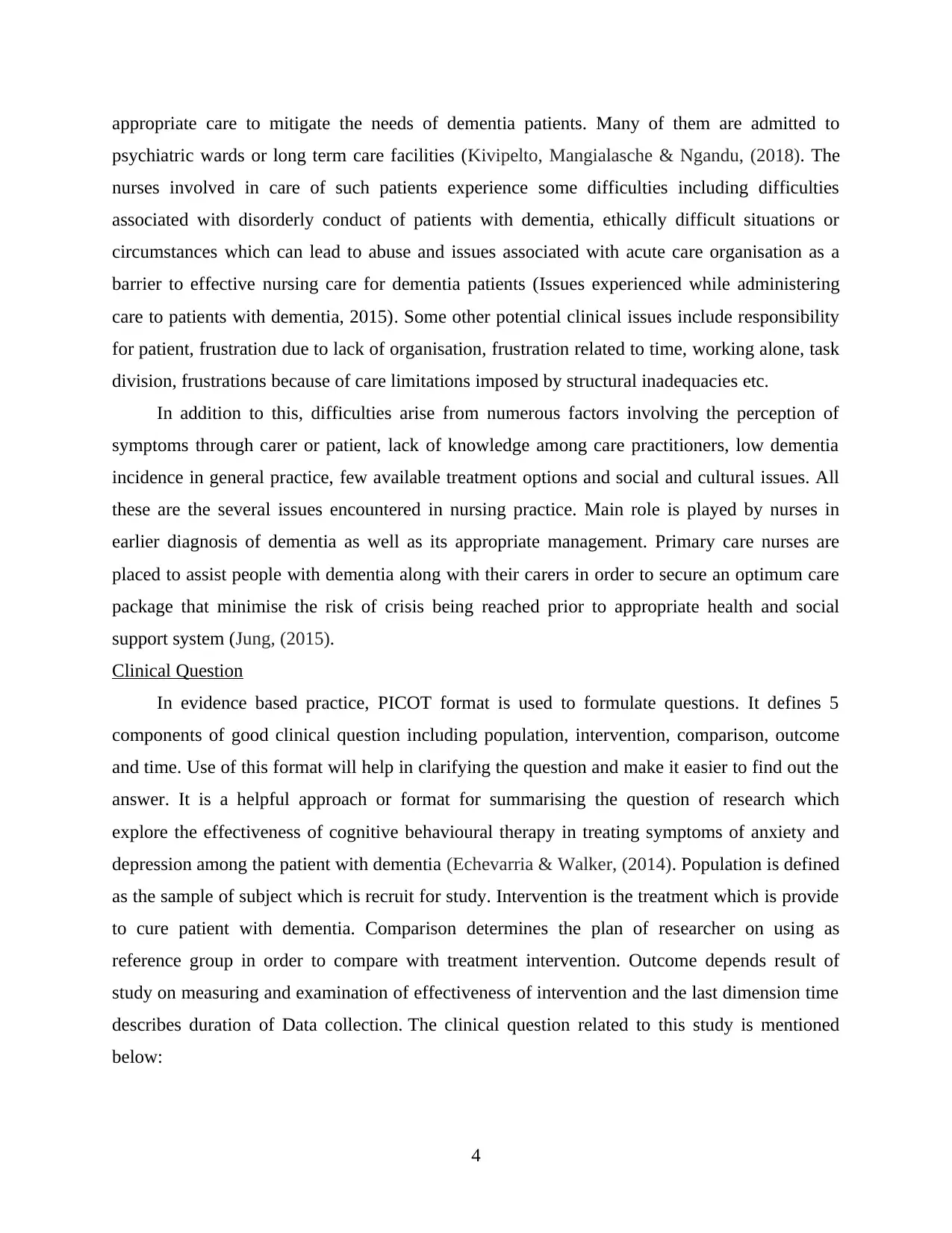
appropriate care to mitigate the needs of dementia patients. Many of them are admitted to
psychiatric wards or long term care facilities (Kivipelto, Mangialasche & Ngandu, (2018). The
nurses involved in care of such patients experience some difficulties including difficulties
associated with disorderly conduct of patients with dementia, ethically difficult situations or
circumstances which can lead to abuse and issues associated with acute care organisation as a
barrier to effective nursing care for dementia patients (Issues experienced while administering
care to patients with dementia, 2015). Some other potential clinical issues include responsibility
for patient, frustration due to lack of organisation, frustration related to time, working alone, task
division, frustrations because of care limitations imposed by structural inadequacies etc.
In addition to this, difficulties arise from numerous factors involving the perception of
symptoms through carer or patient, lack of knowledge among care practitioners, low dementia
incidence in general practice, few available treatment options and social and cultural issues. All
these are the several issues encountered in nursing practice. Main role is played by nurses in
earlier diagnosis of dementia as well as its appropriate management. Primary care nurses are
placed to assist people with dementia along with their carers in order to secure an optimum care
package that minimise the risk of crisis being reached prior to appropriate health and social
support system (Jung, (2015).
Clinical Question
In evidence based practice, PICOT format is used to formulate questions. It defines 5
components of good clinical question including population, intervention, comparison, outcome
and time. Use of this format will help in clarifying the question and make it easier to find out the
answer. It is a helpful approach or format for summarising the question of research which
explore the effectiveness of cognitive behavioural therapy in treating symptoms of anxiety and
depression among the patient with dementia (Echevarria & Walker, (2014). Population is defined
as the sample of subject which is recruit for study. Intervention is the treatment which is provide
to cure patient with dementia. Comparison determines the plan of researcher on using as
reference group in order to compare with treatment intervention. Outcome depends result of
study on measuring and examination of effectiveness of intervention and the last dimension time
describes duration of Data collection. The clinical question related to this study is mentioned
below:
4
psychiatric wards or long term care facilities (Kivipelto, Mangialasche & Ngandu, (2018). The
nurses involved in care of such patients experience some difficulties including difficulties
associated with disorderly conduct of patients with dementia, ethically difficult situations or
circumstances which can lead to abuse and issues associated with acute care organisation as a
barrier to effective nursing care for dementia patients (Issues experienced while administering
care to patients with dementia, 2015). Some other potential clinical issues include responsibility
for patient, frustration due to lack of organisation, frustration related to time, working alone, task
division, frustrations because of care limitations imposed by structural inadequacies etc.
In addition to this, difficulties arise from numerous factors involving the perception of
symptoms through carer or patient, lack of knowledge among care practitioners, low dementia
incidence in general practice, few available treatment options and social and cultural issues. All
these are the several issues encountered in nursing practice. Main role is played by nurses in
earlier diagnosis of dementia as well as its appropriate management. Primary care nurses are
placed to assist people with dementia along with their carers in order to secure an optimum care
package that minimise the risk of crisis being reached prior to appropriate health and social
support system (Jung, (2015).
Clinical Question
In evidence based practice, PICOT format is used to formulate questions. It defines 5
components of good clinical question including population, intervention, comparison, outcome
and time. Use of this format will help in clarifying the question and make it easier to find out the
answer. It is a helpful approach or format for summarising the question of research which
explore the effectiveness of cognitive behavioural therapy in treating symptoms of anxiety and
depression among the patient with dementia (Echevarria & Walker, (2014). Population is defined
as the sample of subject which is recruit for study. Intervention is the treatment which is provide
to cure patient with dementia. Comparison determines the plan of researcher on using as
reference group in order to compare with treatment intervention. Outcome depends result of
study on measuring and examination of effectiveness of intervention and the last dimension time
describes duration of Data collection. The clinical question related to this study is mentioned
below:
4
Paraphrase This Document
Need a fresh take? Get an instant paraphrase of this document with our AI Paraphraser
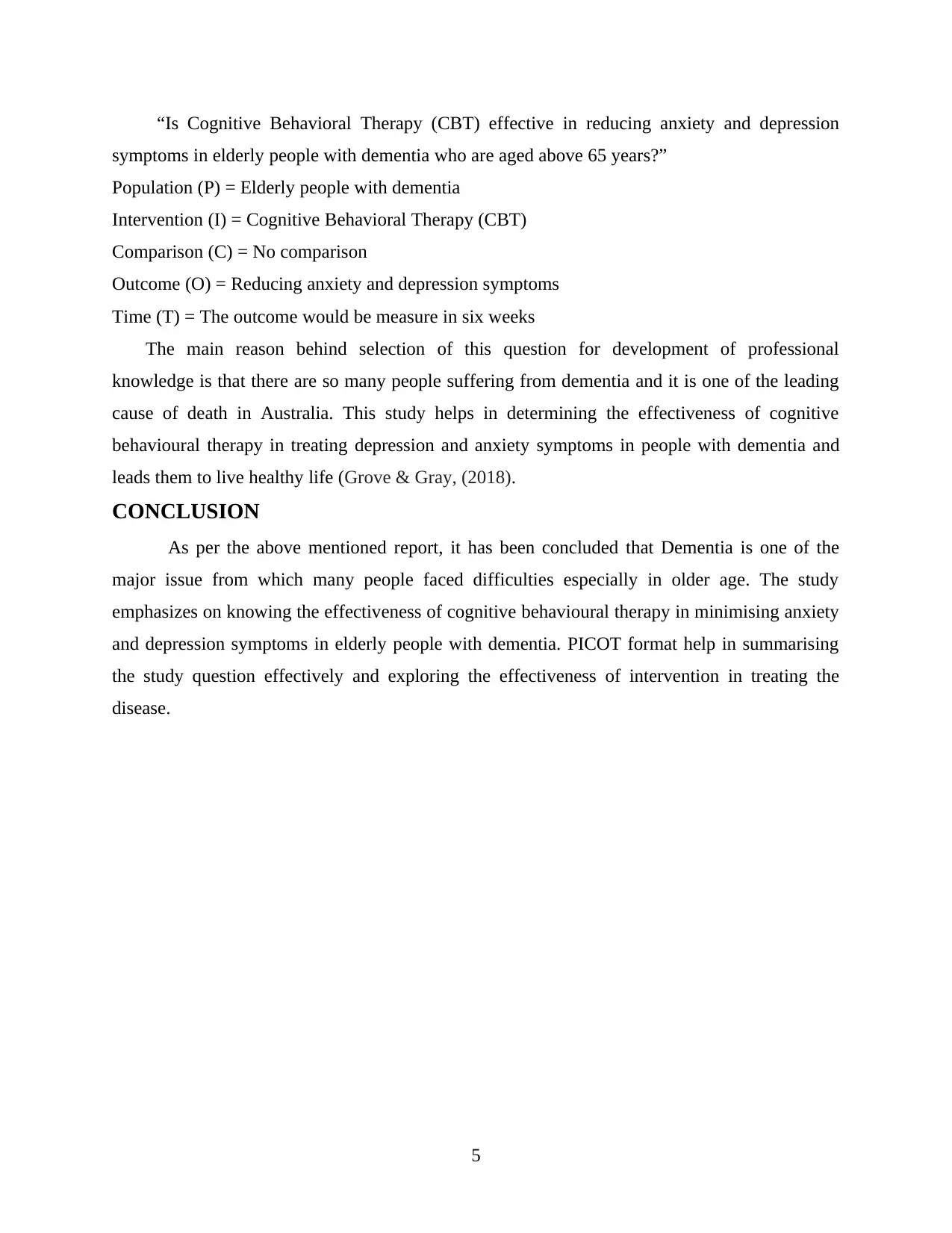
“Is Cognitive Behavioral Therapy (CBT) effective in reducing anxiety and depression
symptoms in elderly people with dementia who are aged above 65 years?”
Population (P) = Elderly people with dementia
Intervention (I) = Cognitive Behavioral Therapy (CBT)
Comparison (C) = No comparison
Outcome (O) = Reducing anxiety and depression symptoms
Time (T) = The outcome would be measure in six weeks
The main reason behind selection of this question for development of professional
knowledge is that there are so many people suffering from dementia and it is one of the leading
cause of death in Australia. This study helps in determining the effectiveness of cognitive
behavioural therapy in treating depression and anxiety symptoms in people with dementia and
leads them to live healthy life (Grove & Gray, (2018).
CONCLUSION
As per the above mentioned report, it has been concluded that Dementia is one of the
major issue from which many people faced difficulties especially in older age. The study
emphasizes on knowing the effectiveness of cognitive behavioural therapy in minimising anxiety
and depression symptoms in elderly people with dementia. PICOT format help in summarising
the study question effectively and exploring the effectiveness of intervention in treating the
disease.
5
symptoms in elderly people with dementia who are aged above 65 years?”
Population (P) = Elderly people with dementia
Intervention (I) = Cognitive Behavioral Therapy (CBT)
Comparison (C) = No comparison
Outcome (O) = Reducing anxiety and depression symptoms
Time (T) = The outcome would be measure in six weeks
The main reason behind selection of this question for development of professional
knowledge is that there are so many people suffering from dementia and it is one of the leading
cause of death in Australia. This study helps in determining the effectiveness of cognitive
behavioural therapy in treating depression and anxiety symptoms in people with dementia and
leads them to live healthy life (Grove & Gray, (2018).
CONCLUSION
As per the above mentioned report, it has been concluded that Dementia is one of the
major issue from which many people faced difficulties especially in older age. The study
emphasizes on knowing the effectiveness of cognitive behavioural therapy in minimising anxiety
and depression symptoms in elderly people with dementia. PICOT format help in summarising
the study question effectively and exploring the effectiveness of intervention in treating the
disease.
5
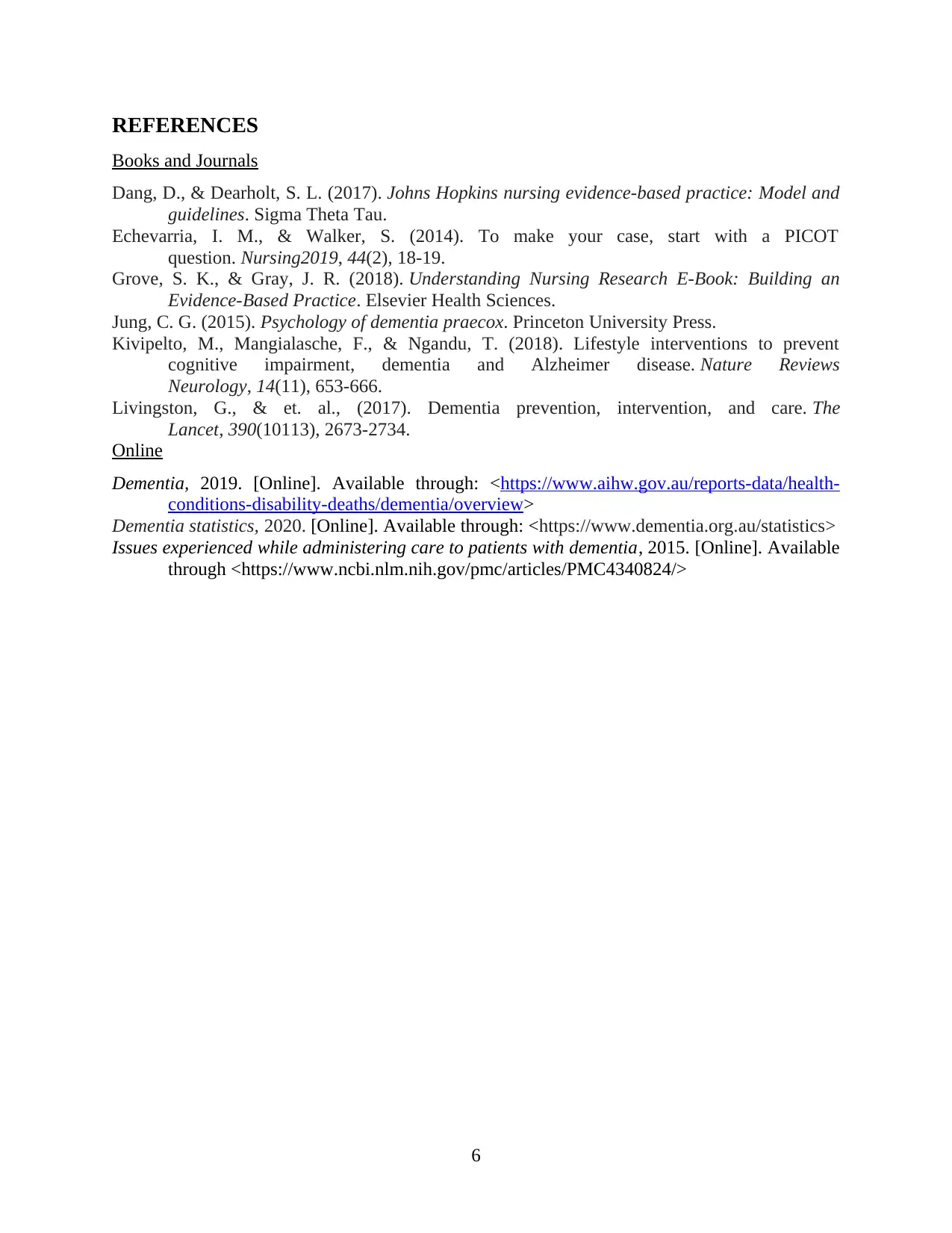
REFERENCES
Books and Journals
Dang, D., & Dearholt, S. L. (2017). Johns Hopkins nursing evidence-based practice: Model and
guidelines. Sigma Theta Tau.
Echevarria, I. M., & Walker, S. (2014). To make your case, start with a PICOT
question. Nursing2019, 44(2), 18-19.
Grove, S. K., & Gray, J. R. (2018). Understanding Nursing Research E-Book: Building an
Evidence-Based Practice. Elsevier Health Sciences.
Jung, C. G. (2015). Psychology of dementia praecox. Princeton University Press.
Kivipelto, M., Mangialasche, F., & Ngandu, T. (2018). Lifestyle interventions to prevent
cognitive impairment, dementia and Alzheimer disease. Nature Reviews
Neurology, 14(11), 653-666.
Livingston, G., & et. al., (2017). Dementia prevention, intervention, and care. The
Lancet, 390(10113), 2673-2734.
Online
Dementia, 2019. [Online]. Available through: <https://www.aihw.gov.au/reports-data/health-
conditions-disability-deaths/dementia/overview>
Dementia statistics, 2020. [Online]. Available through: <https://www.dementia.org.au/statistics>
Issues experienced while administering care to patients with dementia, 2015. [Online]. Available
through <https://www.ncbi.nlm.nih.gov/pmc/articles/PMC4340824/>
6
Books and Journals
Dang, D., & Dearholt, S. L. (2017). Johns Hopkins nursing evidence-based practice: Model and
guidelines. Sigma Theta Tau.
Echevarria, I. M., & Walker, S. (2014). To make your case, start with a PICOT
question. Nursing2019, 44(2), 18-19.
Grove, S. K., & Gray, J. R. (2018). Understanding Nursing Research E-Book: Building an
Evidence-Based Practice. Elsevier Health Sciences.
Jung, C. G. (2015). Psychology of dementia praecox. Princeton University Press.
Kivipelto, M., Mangialasche, F., & Ngandu, T. (2018). Lifestyle interventions to prevent
cognitive impairment, dementia and Alzheimer disease. Nature Reviews
Neurology, 14(11), 653-666.
Livingston, G., & et. al., (2017). Dementia prevention, intervention, and care. The
Lancet, 390(10113), 2673-2734.
Online
Dementia, 2019. [Online]. Available through: <https://www.aihw.gov.au/reports-data/health-
conditions-disability-deaths/dementia/overview>
Dementia statistics, 2020. [Online]. Available through: <https://www.dementia.org.au/statistics>
Issues experienced while administering care to patients with dementia, 2015. [Online]. Available
through <https://www.ncbi.nlm.nih.gov/pmc/articles/PMC4340824/>
6
⊘ This is a preview!⊘
Do you want full access?
Subscribe today to unlock all pages.

Trusted by 1+ million students worldwide
1 out of 6
Related Documents
Your All-in-One AI-Powered Toolkit for Academic Success.
+13062052269
info@desklib.com
Available 24*7 on WhatsApp / Email
![[object Object]](/_next/static/media/star-bottom.7253800d.svg)
Unlock your academic potential
Copyright © 2020–2026 A2Z Services. All Rights Reserved. Developed and managed by ZUCOL.





